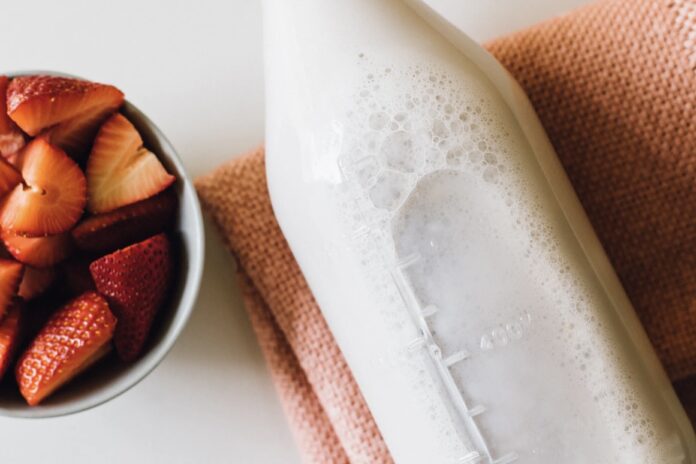There is a lot of talk about gut health in the health and wellness space, and for good reason. As the Mayo Clinic explains, “When the gut microbiome is not balanced, disease risk is higher. A gut that is rich in healthy bacteria may help reduce the risk of inflammatory diseases such as inflammatory bowel disease, irritable bowel syndrome, obesity, and colon cancer.”
One way to improve your gut health is to incorporate probiotic-rich foods into your diet. According to the Cleveland Clinic, “Probiotics are made of good live bacteria and/or yeasts that naturally live in your body. You constantly have both good and bad bacteria in your body. When you get an infection, there’s more bad bacteria, knocking your system out of balance. Good bacteria helps eliminate extra bad bacteria, returning the balance.”
Probiotic-rich foods include kimchi, kombucha, yogurt and, our current favorite, kefir. Kefir is a fermented dairy product that has a tangy and slightly effervescent taste. It is made by combining kefir grains with milk, typically cow’s milk or goat’s milk, and allowing the mixture to ferment for a certain period of time. Despite its name, kefir grains are not actual grains like wheat or rice; they are small, gelatinous clusters of bacteria and yeast that resemble cauliflower florets.
During the fermentation process, the microorganisms in the kefir grains consume the lactose (milk sugar) in the milk, producing lactic acid and other compounds. This fermentation process results in the characteristic flavor and texture of kefir. The drink is known for its probiotic content, which includes beneficial bacteria and yeasts that can have potential health benefits for digestion and gut health. Fermented foods like kefir have been shown to improve “several cardiometabolic outcomes in people with prediabetes or type 2 diabetes,” according to a recent study.
Kefir is a rich source of vitamins, minerals, and nutrients, including calcium, vitamin K2, and B vitamins. It is also often considered easier to digest than regular milk because the fermentation process partially breaks down lactose and protein. If you are lactose intolerant, there are also kefir products made with coconut milk and water for a dairy free option.
We have been having kefir as our first meal of the day with some wild blueberries, chia seeds, and ceylon cinnamon. Not only does that meal provide gut-healthy probiotics, but it also contains antioxidants from the blueberries, fiber from the chia seeds, and blood sugar regulation from the cinnamon.
Always consult with a healthcare professional if you have any concerns about adding kefir to your diet.



